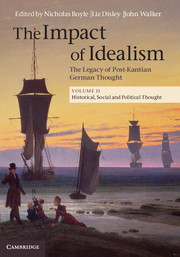Book contents
- Frontmatter
- Contents
- List of Contributors
- Acknowledgements
- List of Abbreviations
- Introduction: Idealism in historical, social and political thought
- 1 From transcendental idealism to political realism
- 2 The public of the intellectuals – from Kant to Lyotard
- 3 Idealism and the idea of a constitution
- 4 German Idealism and Marx
- 5 Ethos, nature and education in Johann Erich von Berger and Friedrich Adolf Trendelenburg
- 6 The concept and philosophy of culture in Neo-Kantianism
- 7 After materialism – reflections of Idealism in Lebensphilosophie: Dilthey, Bergson and Simmel
- 8 ‘Rationalisation’, ‘reification’, ‘instrumental reason’
- 9 Freedom within nature: Adorno on the idea of reason's autonomy
- 10 German neo-Hegelianism and a plea for another Hegel
- 11 Idealism and the fascist corporative state
- 12 Love and recognition in Fichte and the alternative position of de Beauvoir
- 13 Hegel's concept of recognition and its reception in the humanist feminism of Simone de Beauvoir
- 14 Giving an account of oneself amongst others: Hegel, Judith Butler and social ontology
- 15 Idealism in the German tradition of meta-history
- Bibliography
- Index
- References
7 - After materialism – reflections of Idealism in Lebensphilosophie: Dilthey, Bergson and Simmel
Published online by Cambridge University Press: 05 December 2013
- Frontmatter
- Contents
- List of Contributors
- Acknowledgements
- List of Abbreviations
- Introduction: Idealism in historical, social and political thought
- 1 From transcendental idealism to political realism
- 2 The public of the intellectuals – from Kant to Lyotard
- 3 Idealism and the idea of a constitution
- 4 German Idealism and Marx
- 5 Ethos, nature and education in Johann Erich von Berger and Friedrich Adolf Trendelenburg
- 6 The concept and philosophy of culture in Neo-Kantianism
- 7 After materialism – reflections of Idealism in Lebensphilosophie: Dilthey, Bergson and Simmel
- 8 ‘Rationalisation’, ‘reification’, ‘instrumental reason’
- 9 Freedom within nature: Adorno on the idea of reason's autonomy
- 10 German neo-Hegelianism and a plea for another Hegel
- 11 Idealism and the fascist corporative state
- 12 Love and recognition in Fichte and the alternative position of de Beauvoir
- 13 Hegel's concept of recognition and its reception in the humanist feminism of Simone de Beauvoir
- 14 Giving an account of oneself amongst others: Hegel, Judith Butler and social ontology
- 15 Idealism in the German tradition of meta-history
- Bibliography
- Index
- References
Summary
The term Lebensphilosophie was adopted in the early decades of the twentieth century to identify a philosophical trend that distinguished itself by its concern with the conception of life as a creative process, with the continuity of mental experiences associated with that process, and with ‘inner perception’ or intuition as a privileged mode of understanding that process. That trend answered to a number of perceived needs in the broader intellectual culture of the Western world at the time. These included the sense that modern, industrialised societies were generating oppressive institutional structures that constrained creativity and the life choices of individuals; the notion that organising human lives in ways that were more in touch with natural processes and the world of nature might overcome the supposed decadence and degeneracy of contemporary European societies; and the endeavour of interpreting life processes and human cultural activity in ways that looked beyond the ostensibly mechanistic conceptions associated with the rise of the natural sciences and the dominance of philosophical materialism and positivism in the mid-nineteenth century. In the German-speaking world in particular, these three tendencies came together in the well-known cult of Nietzsche around 1900. Nietzsche's writings offered trenchant criticisms of contemporary European culture and educational institutions, as well as challenging inherited philosophical doctrines and seeming to point the way to the cultivation of a higher humanity. But there were other thinkers, equally influential in their day, whose writings bear the traces of a thoughtful dialogue with (as opposed to a scornful repudiation of) the exponents of post-Kantian Idealism, and it is with three of the most prominent of these – Dilthey, Bergson and Simmel – that the present chapter is concerned.
- Type
- Chapter
- Information
- The Impact of IdealismThe Legacy of Post-Kantian German Thought, pp. 161 - 185Publisher: Cambridge University PressPrint publication year: 2013
References
- 1
- Cited by



